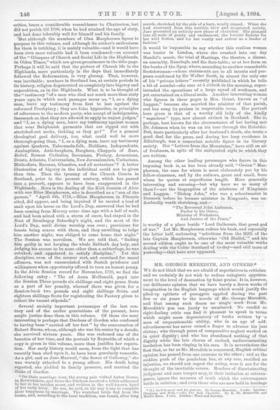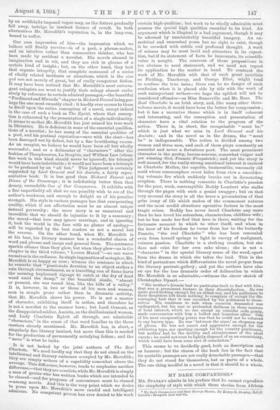MR. GEORGE MEREDITH, AND OTHERS.* Wiz do not think that
we are afraid of superlatives in criticism and we certainly do not wish to reduce eulogistic appraise- ment to the level of damnation by faint praise. It is, however, our deliberate opinion that we have barely a dozen works of imagination in the English language which would justify the piled-up epithets of panegyric applied during the past five or six years to the novels of Mr. George Meredith, and that among such dozen no single work from Mr. Meredith's pen can justly be numbered. No candid or right-feeling critic can find it pleasant to speak in terms which might seem depreciatory of books written by a man of unquestionable ability, who in an age of self. advertisement has never raised a finger to advance his just claims; who through years of comparative neglect worked on in quiet dignity ; and who has abandoned nothing of that dignity while the late chorus of excited, undiscriminating laudation has been ringing in his ears. It is nevertheless the fact that, so far as Mr. Meredith is concerned, English critical opinion has passed from one extreme to the other ; and as the sudden push of the pendulum has, at any rate, rectified an injustice, we should not regret the swing, were it not for the thought of the inevitable return. Readers of discriminating judgment and sane temper may, in their irritation at extrava- gance, ignore the measure of truth which the extravagance holds in solution ; and even those who are now held in bondage (1.) Lord Ormoni and hie Arrant% ]3y Georae Meredith. 3 vole. London Chapman and lle11.--(2.) The Red Cluirlotta. Iiy E. CE. Somerville and Martin Ross. 3 vols. London : Ward and Downey. by an artificially imposed vogue may, as the fetters gradually fall away, indulge in insolent licence of revolt. In both alternatives Mr. Meredith's reputation is, in the long-run, bound to suffer.
Our own impression of him—the impression which we believe will finally survive—is of a poet, a phrase-maker, and an intuitive rather than consecutive thinker, who has been made by accident a novelist. His novels abound in imagination and in wit, and they are rich in gleams of a certain kind of insight ; but, on the other hand, they lack that organic integrity, that complete command of a series of vitally related incidents or situations, which is the sine qud non not merely of great, but of really competent fiction. It may have been noticed that Mr. Meredith's most extrava- gant eulogists are wont to justify their eulogy almost exclu- sively by reference to certain admired passages,—the beautiful "Ferdinand and Miranda" chapter in Richard Feverel being per- haps the one most recently cited : it hardly ever occurs to them to dwell upon the entire conception of a novel, except indeed in the ease of such a book as The Egoist, where that concep- tion is exhausted by the presentation of a single individuality. It seems to us that Mr. Meredith has just missed his true work in literature. He is deficient in some of the essential qualifica- tions of a novelist; he has many of the essential qualities of a poet, and his poetical reputation—save with the elect—has been damaged not by defect, but by a fine bewildering excess. As an essayist, we believe he would have been all but wholly successful ; and as a delineator of " characters " after the fashion of Theophrastus, La Bruyere, and William Law (whose fine work in this kind should never be ignored), his triumph would have been indubitable ; it would not have been a triumph to be profaned by an "all but." This judgment is certainly supported by Lord Ormont and his Aminta, a fairly repre- sentative book. It is less good than Richard Feverel and Diana of the Crossways ; it is indefinitely better than that dreary, unreadable One of Our Conquerors. It exhibits with a fine impartiality all that we can possibly wish to see of the author's weakness, and enough to delight us of his peculiar strength. His style in various passages has that exasperating quality, which if not affectation must be an almost unique natural perversity ; the mere story is so unnatural and incredible that we should do injustice to it by a summary ; the moral—that love may ignore marriage, and in ignoring it, look the world in the face with no glance of apology— will be regarded by the best readers as not a moral but the reverse. On the other hand, when Mr. Meredith is at his best, his literary manner has a wonderful charm of word and phrase and image and general form. The sentences sparkle oftener than they glow, but when they glow—as in the chapter in the third volume, "Lovers Mated "—we can warm ourselves in the radiance. In single ingenuities of metaphor, Mr. Meredith is as happy as ever ; witness the sentence in which he remarks that "passionate devotion to an object strikes a vein through circumstances, as a travelling run of flame darts the seeming haphazard zigzags to catch at the dry of dead wood amid the damp," or the beautiful simile, "absent or present, she was round him, like the hills of a valley." It is, however, in two or three of his men and women, seen in simple prose rather than in dramatic activity, that Mr. Meredith shows his power. He is not a master of character, exhibiting itself in action, and therefore he is not a novelist to the manner born ; but Lord Ormont, as the disappointed soldier, Aminta, as the disillasionised woman, and Lady Charlotte Eglett all through, are admirable "characters," in the sense of that word familiar to the three masters already mentioned. Mr. Meredith has, in short, a singularly fine literary instinct, but more than this is needed for the production of permanently satisfying fiction ; and the "more" is what he lacks.
It is not lacked by the joint authors of The Real Charlotte. We need hardly say that they do not stand on the itntellectual and literary eminence occupied by Mr. Meredith ; they are simply writers of a capability somewhat above the average. This difference, however, tends to emphasise another difference,—that they are novelists, while Mr. Meredith is simply a man of genius who has written books which are intended to be classed—and for purposes of convenience must be classed .---among novels. And this is the very point which we desire to press upon Mr. Meredith's more candid and intelligent admirers. No competent person has ever denied to his work certain high qualities ; but work to be wholly admirable must possess the special high qualities essential to its kind. An argument which is illogical is a bad argument, though it may be adorned by unmistakably beautiful imagery. An un- metrical and unmusical poem has no right to exist, though it be crowded with subtle and profound thought. A work of science may be most lucid and attractive in its exposi- tion, but if its statement of facts be inaccurate, its scientific value is nought. The converse of these propositions is too obvious to need statement, and we need not repeat its application to the matter in hand. To contrast the work of Mr. Meredith with that of such great novelists as Fielding, Tha,ckeray, and George Eliot, might tend to confuse the true issue; there can be no danger of such confusion when it is placed side by side with the work of such unimportant writers—we hope the epithet will not be considered offensive—as Miss Somerville and Mr. Ross. The Real Charlotte is an Irish story, and, like many other three- volume novels, it would have been the better for compression ; but it has a narrative theme which is in itself coherent and interesting, and the conception and presentation of character have a vital relation to the progress of the action. There is, in short, the recognisable "must be," which is just what we miss in Lord Onnont and his Aminta; and in the novel as in the drama, the "must be" is indispensable. The action is divided among twa women and three men, and each of them plays constantly an essential and never a fortuitous part. The most prominent character is the pretty, harum-scarum, somewhat vulgar and yet winning flirt, Francis Fitzpatriok ; and yet the story is well named, for the really strong emotional interest is centred in Charlotte Mullen, the capable, businesslike, unoomely old maid whose commonplace crust hides from view a smoulder- ing volcanic fire which suddenly breaks out in devastating eruption. There is nothing romantic in Charlotte's passion for the poor, weak, contemptible Roddy Lambert who stalks through the pages with such a genial swagger; but on that very accotuit the story is all the truer a presentation of that grim irony of life which makes of the commonest natures and the most sordid situations operative factors in the most tragic crises. Roddy has never loved Charlotte any more than he has loved his colourless, characterless, childless wife ; but he has made her feel that love is there, waiting for the fortunate moment in which to utter itself, and when in the hour of his freedom he turns from her to the butterfly Francie, "the real Charlotte" who has been concealed even from herself springs to light in energy of malignant, ruinous passion. Charlotte is a striking creation, but she does not exist for her own sake -alone; she is not a " character " in the special literary sense of the word, apart from the drama in which she takes the lead. This is the kind of portraiture which differentiates the novel proper from the literary portrait-gallery ; and yet the authors have also an eye for the less dramatic order of delineation in which Mr. Meredith is so admirable,—witness the clever sketch of Christopher Dysart :— " His mother's friends had no particular fault to find with him ; that was a prominent feature in their dissatisfaction. He was quite good-looking enough for an eldest son, and his politeness to their daughters left them nothing to complain of except the dis- couraging fact that it was exceeded by his politeness to them- selves. His readiness to talk when occasion demanded was undisputed, but his real or pretended dullness in these matters of local interest, which no one except an outsider calls gossip, made conversation with him a hollow and heartless affair. One of his most exasperating points was that he could not be referred to any known type. He was between the sizes,' as shopmen say of gloves. He was not smart and aggressive enough for the soldiering type, nor sporting enough for the country gentleman,, but neither had he the docility and attentiveness of the ideal curate ; he could not even be lightly disposed of as an eccentricity„ which would have been some sort of consolation."
This seems to us decidedly good, both as description and as humour ; but the charm of the book lies in the fact that its quotable passages are not really detachable passages,—that they do not stand for themselves, but as parts of a whole. The one thing needful in a novel is that it should be a whole.



































 Previous page
Previous page